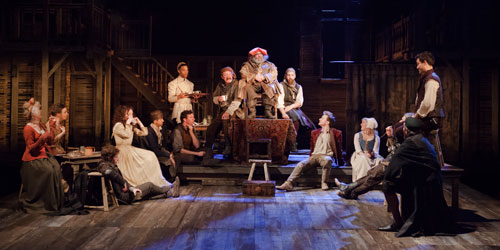Gregory Doran’s clearly got big plans for the Henriad. 2013’s Richard II charted a descent from majesty. Although Henry IV Part One opens with the solemn procession of the King’s men fresh from the crusades, it is clear throughout that Doran wishes to portray the struggle from the pits of Eastcheap to an earned, rather than stolen, monarchy. The imagery of an usurped Richard is invoked constantly, including a very literal ghost watching Henry’s coronation within the first sequence on stage.
The reverent Henry, surrounded by candles and chainmail clad warriors, differs greatly to his son Hal. Immediately after this procession, a large messy bed is carted onto the stage, carrying a rather busy Hal. To use a Shakespearian euphemism, he is “going to’t” with two prostitutes. Hal is living the dream of sex, drink, and zero responsibility. Pair this with the embodiment of all things irresponsible, the brilliantly animated and utterly reprehensible Falstaff as portrayed by Antony Sher. It’s no surprise that Falstaff is the main focus of the RSC’s advertising campaign; Sher completely does the famous fat man justice.
However, the stand out performance was that of Trevor White, who plays Hotspur. The bleach blonde villain of the piece, a strong and dominant voice of the revolution, reminded me of a young John Simm, with his excellent manic vitality. He jumped possessed about the stage with glee at the prospect of defeating Henry IV, even with the knowledge of his depleted troops. His restless energy really helped to lend to a sense of oncoming chaos, which he leads onto the battlefield in the form of a northern rebellion. Although it is clear that Hotspur is young, inexperienced, and doomed to fail, White carried his performance so perfectly I could have been fooled into thinking he may have defeated Hal during their open combat.
Hal, played by Alex Hassel, was somewhat less authoritative than previous Hals I have seen portrayed in previous adaptations. If anything, this really highlighted sympathy for the young prince, forced to grow up too soon. Despite shirking the commands of his father, he constantly looks to Falstaff or Poins for guidance, and when this disappears in the war it is incredibly striking. His dismay that Falstaff could joke about death so happily was brilliant, and foreshadowed his dismissal of his companion in Part Two excellently. When at battle with Hotspur, he is struck dumb at killing his opponent, which offers up a fantastically quiet moment amongst the clash of steel, almost haunting the conflict around them.
The mesh of comedy and revolt within the play is a tricky concept, but Doran’s gradual erasure of comedy from the stage is done without being too obvious, similar to the subtle references to Richard’s deposition. My personal highlight, however, is the famous tavern scene. The play extempore is a fantastically strong ensemble piece, with the entire tavern acting as a royal court. Their rowdy replacing of the king’s men reflects upon Hotspur’s own plans, and the staged ramshackle of a “throne” superbly infers Falstaff’s assumed, but utterly false, importance. Hal’s abrupt ending of the frivolity, signifying his maturing to adulthood, captures the ensemble brilliantly.
I couldn’t recommend this more. Doran offers up the perfect classical alternative to summer blockbusters: further highlights include the multirolling Elliot Barnes-Worrell, and the Welsh musical piece performed by Nia Gwynne, but it all comes together in the tavern scene. The ongoing sense of duty to the throne overrides Hal’s personal gains, coming together in an arresting battlefield sequence. 4/5
Review written by Louise Jones.
Henry IV is currently showing at the Royal Shakespeare Company until Saturday 6th September. For more information on the production, visit here…



Leave a Comment